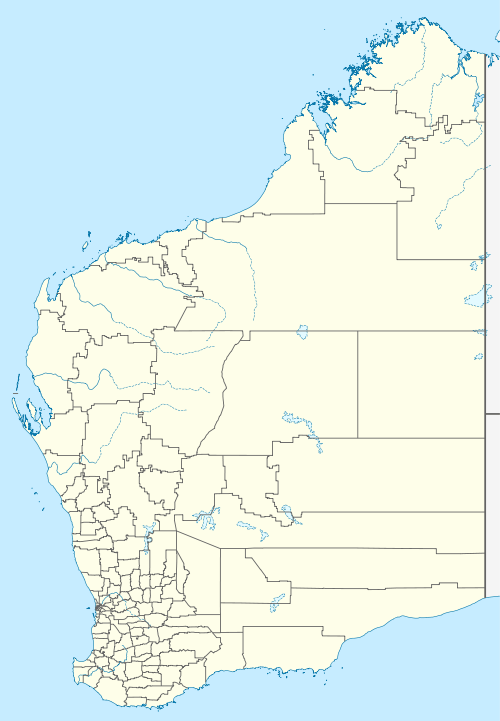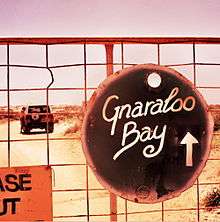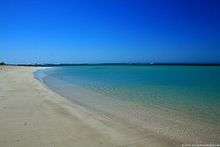Gnaraloo
Gnaraloo is a working pastoral station and wilderness tourism business located in the Gnaraloo Bay in the Shire of Carnarvon, Western Australia. It is adjacent to the Ningaloo Marine Park and 150 km (93 mi) north of Carnarvon. It is famous for its coastline, wildlife and fishing and waves and wind.[1][2]


The main surf break in the area is known as "Tombstones", which is a heavy barrelling left-hander.[3][4]
History
The area was pioneered by Donald Fleming who, in partnership with Arthur Nicol, took up land in the area including Gnaraloo. At the time it was known as "Flemington". He later sold it to Frank Mottram but stayed in the area until 1935.[5] In 1908 the station was 90,000 acres (36,422 ha) in size and was held by Forrest, Emanuel and Co. who paid a £70 rental on the property.[6] Under Mottram's ownership in 1910, the station was running about 1,500 sheep with the flock increasing in size to 3,554 in 1911 despite no stock being bought in that time.[7][8] Following a good season another 800 lambs were tailed in 1912 increasing the size of the flock further.[9]
The Mottrams sold the lease to Dansy Powell and Harry Cordes in 1921,[10] with a flock of 9,000 sheep and now encompassing an area of 190,000 acres (76,890 ha) with the lease due to expire in 1948. The property was advertised with 70 miles (113 km) dividing it into 12 paddocks with 9 wells, 8 with windmills, tanks and troughs. The homestead had three large rooms, an office and a store room with a detached stone kitchen.[11] The station had a good year in 1922 with 9,000 sheep shorn and with an estimated 1,500 stragglers to be mustered and clipped. 223 bales of wool were produced, and the stock were all reported to be in good condition.[12]
Powell and Cordes sold the station in 1927 to a partnership between Alex Fleming and George Baden Powell.[13] It station was sold again in 1928 when the Gnaraloo Pastoral Company formed between the Fleming and Powell families was dissolved;[14] the Fleming family came to own the station outright again with Donald's son, Alex Fleming owning the station from 1928 until at least 1954.[15] Gnaraloo remained in the Fleming family until 1975.
In 2015 the station owners had to renegotiate the lease agreement with the state government, including having the government excise sections of pastoral land along the world-heritage listed Ningaloo Coast from the property, for conservation and tourism ventures.[16]
Geography

Topography and surrounding regions
The homestead property is located on elevated ground approximately 500 m (1,600 ft) east of the coast and 16 km (9.9 mi) west of Lake MacLeod.[17][18] The station has an area of 90,000 ha (222,395 acres) with approximately 65 km (40 mi) of coastline.[1] Gnaraloo Bay contains four stretches of sandy beaches. They are paralleled by a near-continuous 200 to 500 m (660 to 1,640 ft) wide barrier reef 1.5 km (0.93 mi) off in the adjacent waters. The main beach is the Gnaraloo beach, located about 3 km (1.9 mi) south of the homestead and about 3.4 km (2.1 mi) in length. Nine Mile Bore and Cape Farquhar, each with three beaches, are located north of Gnaraloo Bay, just before Ningaloo.[17][19] Red Bluff and the Quobba homestead are located at the south.[20]
Climate
Gnaraloo has a mean and median annual rainfall of 203 and 230 mm (8.0 and 9.1 in) respectively. Most of which falls in May to July. The annual evaporation is c. 2,800 to 3,000 mm (110 to 120 in).[18][21]
The area received heavy rains in 1953 with Gnaraloo being deluged with 610 points (155 mm, 6.1 in)[22] of rain over two days. Surrounding stations received falls of up to 76 mm (3 in).[23]
Transportation
Gnaraloo can be reached by land from Carnarvon through the Gnaraloo road.[24] A small airstrip is also present just outside the Gnaraloo leased area, but there are no scheduled flights.[25] The airstrip was slated for an upgrade in 2008 to allow better access for the Royal Flying Doctor Service.[26]
Conservation
Gnaraloo station commenced its turtle conservation program in 2008 under the guidance and direction of the WA Department of Environment and Conservation (DEC). The Gnaraloo Turtle Conservation Program (GTCP) does daily patrols for the entire loggerhead nesting season (November–February).
A feral animal control program was implemented in 2009 to work alongside the sea turtle conservation program due to introduced predators being an environmental risk to sea turtle nest success.
In 2010 the station won the Environment Protection Category in the Keep Australia Beautiful's Clean Beach Awards, for its efforts in the conservation of the area's flora and fauna, particularly the Critically Endangered species of sea turtles nesting in the area.[27][28][29]
Notes
- Butler, Bruce.(1999) They're blowing in the wind. Sunday times (Perth, W.A.) 10 January 1999, Sunday section p.4-5
- Gnaraloo – wavesurfing and other attractions at the Station. The West Australian, 28 July 1988, p.116; 2 June 1989, p.55; 1 August 1989, p.4,8,11; 14 September 1990, p.18; 7 May 1993, p.47
- http://www.surfingatlas.com/spot/2638
- Courtney Brown (2010) Tombstones, Gnaraloo Western Australia. (2010-12-01). In Surfing. 46 (12), 112(1).
- "North-west pioneer". The Northern Times. Carnarvon, Western Australia: National Library of Australia. 3 October 1940. p. 7. Retrieved 10 June 2012.
- "The meat supply". Daily News. Perth: National Library of Australia. 18 September 1908. p. 3. Retrieved 10 June 2012.
- "Local and general". The Northern Times. Carnarvon, Western Australia: National Library of Australia. 2 July 1910. p. 2. Retrieved 10 June 2012.
- "Gascoyne". The Northern Times. Carnarvon, Western Australia: National Library of Australia. 24 February 1912. p. 4. Retrieved 10 June 2012.
- "Gnaraloo". The Northern Times. Carnarvon, Western Australia: National Library of Australia. 5 October 1912. p. 3. Retrieved 10 June 2012.
- "Obituary: Mr. Dansy Powell". The Northern Times. Carnarvon, Western Australia: National Library of Australia. 31 March 1928. p. 6. Retrieved 15 December 2013.
- "Advertising". Sunday Times. Perth: National Library of Australia. 4 September 1921. p. 5. Retrieved 10 June 2012.
- "North-west pastoral news". The Northern Times. Carnarvon, Western Australia: National Library of Australia. 4 February 1922. p. 5. Retrieved 11 June 2012.
- "Sale of station property". The Northern Times. Carnarvon, Western Australia: National Library of Australia. 10 September 1927. p. 7. Retrieved 11 June 2012.
- "Advertising". The West Australian. Perth: National Library of Australia. 5 April 1928. p. 9. Retrieved 11 June 2012.
- "In and around Carnarvon". The Northern Times. Carnarvon, Western Australia: National Library of Australia. 10 April 1952. p. 2. Retrieved 10 June 2012.
- Lucie Bell (29 May 2015). "Five weeks and counting: Negotiations ongoing as Western Australia's pastoral lease rollover approaches". Australian Broadcasting Corporation. Retrieved 19 December 2015.
- Short, Andrew D. (2005). Beaches of the Western Australian Coast – Eucla to Roebuck Bay: A Guide to Their Nature, Characteristics, Surf and Safety. Sydney University Press. pp. 322–323. ISBN 9780958650434.
- Directory of Important Wetlands in Australia (14 April 2010). "Lake MacLeod – WA009". Department of the Environment, Commonwealth of Western Australia. Retrieved 15 December 2013.
- Beachsafe. "Gnaraloo Bay". Surf Life Saving Australia. Retrieved 15 December 2013.
- Gnaraloo: The Real Thing. "How do I get to Gnaraloo?". Retrieved 15 December 2013.
- J.C. Ellison & S. Simmonds (2003). "Structure and productivity of inland mangrove stands at Lake MacLeod, Western Australia" (PDF). Journal of the Royal Society of Western Australia. 86: 25–30.
- "Climate Data Online – definition of rainfall statistics". Bureau of Meteorology. Retrieved 10 June 2012.
- "Heavy rain reaches stations". The West Australian. Perth: National Library of Aust. 8 May 1953. p. 21. Retrieved 10 June 2012.
- Caring for our Country. "Protecting critical aquatic ecosystems, Priority Site 11: Lake MacLeod" (PDF). Department of Agriculture & the Department of the Environment, Commonwealth of Australia. Retrieved 15 December 2013.
- "Gnaraloo Station Airport Details". Air Ambulance. Archived from the original on 15 December 2013. Retrieved 15 December 2013.
- Gnaraloo: The Real Thing (22 August 2008). "Airstrip Upgrade to RFDS 24 Hour Standard At Gnaraloo Station". Archived from the original on 15 December 2013. Retrieved 15 December 2013.
- WA News (14 April 2010). "WA's number one beach crowned". Fairfax Media. Retrieved 15 December 2013.
- Gnaraloo: The Real Thing (14 April 2010). "Gnaraloo Wins Clean Beach Award 2010 for Environmental Protection". Archived from the original on 15 December 2013. Retrieved 15 December 2013.
- Donna Faragher (14 April 2010). "Rockingham cleans up State beach award" (PDF). Ministerial Media Statements, Government of Western Australia. Archived from the original (PDF) on 4 March 2016. Retrieved 15 December 2013.
External links
| Wikimedia Commons has media related to Gnaraloo. |